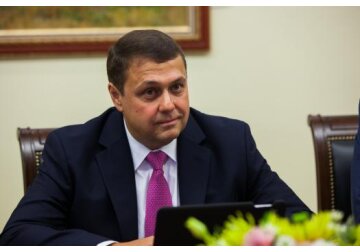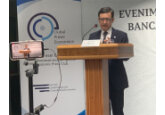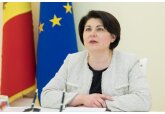
The IMF mission reaches staff-level agreement with the Moldovan authorities on the first review of the program and, if approved by the Executive Board of the Fund, the country will receive $27 million in September.
This is what the International Monetary Fund said in a statement after its mission, led by Ruben Atoyan, held discussions with the Moldovan authorities from July 20 to August 10 in Chisinau remotely as well, from the head office, in the context of the first review of Moldova's current program. The IMF said the consequences of Russia's invasion of Ukraine, including rising food and energy prices, trade disruptions, an influx of refugees and declining public confidence, continue to affect Moldova's economic prospects. Increased funding from the IMF and other donors plays a key role in helping the authorities cope with external shocks. Ruben Atoyan said the IMF mission reached a staff-level agreement with the Moldovan authorities on the policy measures needed to complete the first review under the program. The agreement is subject to approval by the IMF Executive Board, which will consider the request for completion of the first review of the program in September 2012. After the Executive Board's meeting, Moldova will be able to receive about $27 million, which will bring the total amount of the provided funds within the program to about $245 million. Ruben Atoyan said that the program with the Fund is successfully implemented, despite the severe and intertwined shocks. According to him, the authorities have fulfilled all the criteria of the program implementation. The structural reforms supported by the program in the fields of anti-corruption, rule of law, fiscal management and supervision of the financial sector are advancing at a fast pace. The authorities appointed a new head of the Anti-Corruption Prosecutor's Office, an important milestone in the program, in June of this year, well ahead of schedule. The authorities have continued to implement much-needed reforms despite the successive upheavals, thus reaffirming their active engagement and commitment to the program. The Head of the IMF Mission stressed that, at the same time, the war in Ukraine continues to have a significant negative impact on the Moldovan economy. Real GDP is expected to stagnate in 2022. In addition to the deterioration of the global economic outlook, supply disruptions and rising production costs, the economy is also affected by the adverse effects of the drought on agricultural production. Inflation accelerated sharply due to higher energy and food prices. The MDL depreciated: this is how the exchange rate responded to difficult market conditions. Fiscal performance remained solid in the first half of 2022, reflecting a favorable combination of higher budget revenues and grants, as well as poor execution of approved budget expenditures. Being well capitalized, liquid and profitable, the banks survived the impact of the current crisis satisfactorily. Ruben Atoyan said that in monetary policy matters, the National Bank of Moldova relies solely on data and statistical information, which has played an important role in fixing inflation expectations. Since the beginning of the year, the NBM has adjusted its monetary policy to contain the effects of imported inflation and supply disruptions. Since the inflation outlook is clouded by a worsening external environment, the NBM will continue to maintain a flexible exchange rate, because it acts as a shock absorber, and interventions in the foreign exchange market will be limited in order to smooth out excessive market volatility and prevent market disruption. The head of the IMF mission noted that the draft amendments to the State Budget Law for 2022, agreed with IMF experts, appropriately provides for additional funds to protect the vulnerable from rising energy and food prices. According to him, a concerted effort is needed going forward to address the persistent under-implementation of approved budget expenditures. Given the risks of a possible deterioration of the situation, the authorities' decisive advance of policy measures will be crucial to ensure budget support from external partners. Ruben Atoyan noted that the risks of worsening of the economic situation are still present. Sharper-than-anticipated energy prices, disruptions in energy supplies, a rise in global food prices, higher costs of living and the proximity of the war may further undermine economic activity and public confidence, which may necessitate compromises on policy measures. "Resolute implementation of a comprehensive package of reforms and continued support from the IMF and other partners would anchor confidence," he said. // 11.08.2022 – InfoMarket







